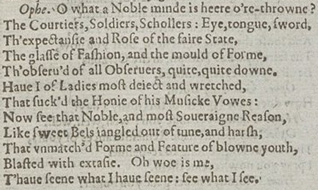
The physicality of this staging suggests more, however, than simply a backward look at the relationship that formerly existed between the father and the son. It is, as John Ammerman says, the moment in the play in which the action of the plot is stepped up, where we as an audience are given the crucial facts about the murder that will direct the play from here on. As such, the scene represents a new stage in that father/son relationship, a moment of transition in which Hamlet's future words, actions, his very identity, are being radically reshaped by his interaction with the Ghost. The incapacitation of Hamlet by his contact with the ghost which John describes above, thus lends itself to another, quite different, reading.
Andrew Hartley: Father and son coming together
CLIP 10
|
Compare Hamlet's relationship with his father as described here with his relationship to his mother. Does the latter show signs of 'thought processes coming together'? How does Hamlet's relationship with his mother change during the course of the play -- from the opening council scene, through the exchange in her closet, through the final scene of death? What effect can a flashback to the murder scene have in a film? If you were directing the play as a film, would you include a flashback? Why or why not? |
Andrew Hartley: Hamlet becoming possessed by the Ghost
CLIP 11
In this Atlanta, Georgia production, "what has happened between [Hamlet] and the Ghost in this moment is something which takes over him, transforms him makes Hamlet an agent of the Ghost" (Hartley).
In a 1980 London production of the play starring Jonathan Pryce, this notion of being taken over was portrayed even more extremely and violently: "There was to be no visible Ghost. . . . The Ghost was inside Hamlet. No longer an objective, if ambiguous, fact, he became an inner torment speaking in a strange, distorted voice, which was wrenched out of Hamlet in the midst of extreme pain and violent retching. . . . Hamlet was 'a medium at an unlooked-for seance, half-booming, half-burping up the words of his father's spirit' (Nightingale, New Statesman, 11 April) and his voice 'an unearthly robot croak well[ing] up from his guts' (Times, 3 April); he 'struggles and retches as if in the grip of a diabolic possession' (Observer, 6 April)" (Dawson 163).
| Which lines in
the text do you think prompted Pryce's interpretation of the father/son
dynamic? Does the play give us an optimistic view of the relationships between generations: Hamlet and Ghost? Hamlet and Claudius? Hamlet and Polonius? Laertes and Polonius? Laertes and Claudius? Fortinbras and his uncle? Lucianus and Gonzago? What about men like the Player King or the Gravedigger? How do Hamlet's relationships with these men compare with his relationships with those mentioned above? |
Ophelia's Reaction to Hamlet's Transformation (Nunnery Scene - 3.1):

|
Ophelia speaks of Hamlet's lost or altered identity. Where else in the play do we hear characters discuss Hamlet's transformation? How do issues of identity and transformation manifest themselves in the play generally? |
---
Dawson, Anthony B. Shakespeare in Performance: Hamlet. Manchester: Manchester UP, 1995.
* * * * *